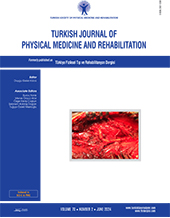Is it possible to objectively determine morning stiffness in rheumatoid arthritis?
2 Department of Physical Medicine and Rehabilitation, Medicine Faculty of Muğla Sıtkı Koçman University, Muğla, Türkiye
3 Department of Physical Medicine and Rehabilitation, Koç University, School of Medicine, Istanbul, Türkiye
4 Department of Physical Medicine and Rehabilitation, Division of Rheumatology, Medicine Faculty of Gazi University, Ankara, Türkiye
5 Department of Physical Medicine and Rehabilitation, Medicine Faculty of Gazi University, Ankara, Türkiye DOI : 10.5606/tftrd.2024.12219 Objectives: This study aimed to objectively and quantitatively exhibit morning stiffness by using electrophysiological methods.
Patients and methods: The prospective, controlled study was conducted with 52 participants between February 2013 and February 2014. Of the participants, 26 were recruited among RA patients (3 males, 23 females; mean age: 55.9±11.2 years; range, 24 to 74 years) followed at the rheumatology clinic, and 26 were healthy subjects (4 males, 22 females; mean age: 54.9±8.3 years; range, 41 to 70 years) for the control group. Duration and severity of morning stiffness were recorded for all participants. Activity of disease and functional status were evaluated by the Disease Activity Score 28 and Health Assessment Questionnaire (HAQ), respectively. Electrophysiological reaction times, severity of pain (Visual Analog Scale), HAQ, and grip strength were measured for each participant twice in 24 h in the morning (08:00-09:00 am) and afternoon (03:00-05:00 pm).
Results: In the RA group, motor reaction and response times and severity of pain values were significantly lower in the afternoon compared to the morning (p=0.030, p=0.031, and p=0.002, respectively), and hand grip strengths were significantly higher in the afternoon (p=0.007). In the control group, no change was observed between morning and afternoon measurements in the strength and reaction time variables.
Conclusion: Our hypothesis that stiffness would slow down the movements in the morning in RA was supported by the prolonged motor and response times in the morning compared to the afternoon. However, in the control group (no morning stiffness), there was no difference in reaction time variables between the morning and afternoon, objectively demonstrating the concept of morning stiffness in this study.
Keywords : Morning stiffness, reaction time, rheumatoid arthritis

















